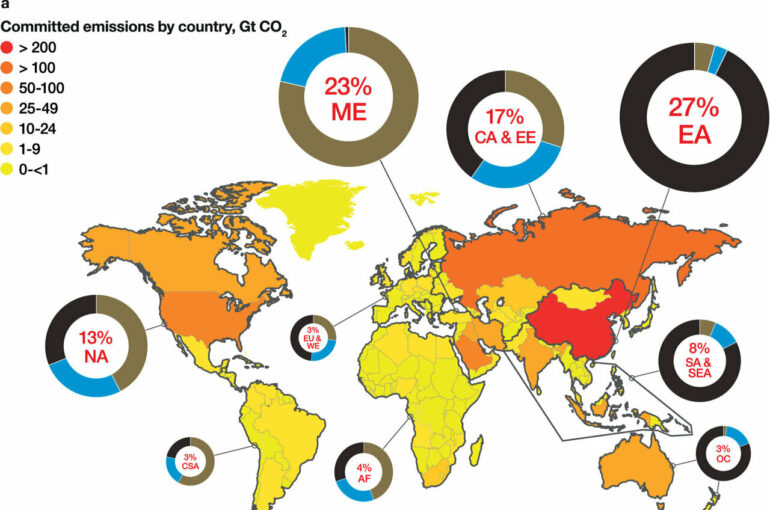Ceasing new oil, gas, and coal development is not enough—already built extraction facilities must be prematurely decommissioned—warns a new study released today in Environmental Research Letters.
The study finds that, in the absence of large-scale carbon capture or removal, nearly 40% of developed fossil fuel reserves need to stay in the ground to keep the 1.5°C limit in reach.
The research provides the first complete assessment of committed or “locked in” carbon dioxide (CO2) emissions of existing and approved fossil fuel extraction facilities. It is the first peer-reviewed study that expands on the International Energy Agency’s (IEA) recent finding that no new coal mines or oil and gas fields can be developed under a 1.5°C warming limit.
“Our findings show that halting new extraction projects is a necessary step, but still not enough to stay within our rapidly dwindling carbon budget,” said co-lead author, Greg Muttitt of the International Institute for Sustainable Development. “Some existing fossil fuel licenses and production will need to be revoked and phased out early. Governments need to start tackling head-on how to do this in a fair and equitable way, which will require overcoming opposition from fossil fuel interests.”
The team, led by researchers from Oil Change International and the International Institute for Sustainable Development, used a commercial database of over 25,000 oil and gas fields and developed a new dataset of coal mines across nine of the largest coal-producing countries. Using this data, they estimate that developed fields and mines could lead to cumulative emissions of 936 Gt CO2 if their reserves are fully depleted and burned. These committed emissions are 60% larger than the remaining carbon budget for 1.5°C and exhaust the remaining budget for staying well below 2°C, the upper bound of the Paris Agreement.
The Intergovernmental Panel on Climate Change recently warned that some fossil fuel-burning infrastructure must be retired early to stay below 1.5°C. This new study finds that emissions “lock-in” from existing investments in fossil fuel extraction may be even larger, warranting equivalent policy attention. At the COP26 climate summit in Glasgow, several governments launched a Beyond Oil & Gas Alliance, committing to end new licensing for oil and gas exploration and production—one of the necessary policy steps identified in the study.
“Our study reinforces that building new fossil fuel infrastructure is not a viable response to Russia’s war on Ukraine,” said co-lead author Kelly Trout of Oil Change International. “The world has already tapped too much oil, gas, and coal. Developing more would either cause more dangerous levels of warming, if fully extracted, or create a larger scale of stranded assets.”
The study finds that Russia, with its large developed reserves of oil, gas and coal, accounts for 13% of the global total. Almost 90% of developed fossil fuel reserves are located in just 20 countries, led by China, Russia, Saudi Arabia, the United States, followed by Iran, India, Indonesia, Australia, Canada, and Iraq.
“As governments work to reduce their dependence on Russian oil, gas and coal in response to the current crisis, they must recognize that developing new reserves elsewhere takes years and will not make up for short-term scarcity,” said co-author Roman Medelevitch of the Ӧko-Institut. “Where possible, governments should rather take advantage of scarcity price signals to push for sufficiency and efficiency measures and to promote renewable energy sources.”
The study notes that, by ceasing to issue new licenses or permits for fossil fuel exploration or extraction, governments could both avoid further entrenching legal and political barriers to mitigation policies and minimize stranded assets. “Each new coal mine, gas well or oil field that is developed deepens political entanglement with the fossil fuel industry. Increasing the scale of extraction-related jobs and investments only makes it harder for governments to manage,” said co-author Thijs Van de Graaf from Ghent University.
“Our research should also be a warning sign for publicly listed companies and their investors that reserves that are on the books to be developed cannot be developed to stay below 1.5°C. Fossil fuel companies that claim to be aligned with the Paris Agreement and that need to transition their core businesses, need to accelerate their transition plans,” said co-author Dimitri Lafleur of Global Climate Insights.
The study does not attempt to answer the question of which developed coal, oil, and gas reserves should be decommissioned and which “fit” within the 1.5°C carbon budget, noting that this requires grappling with questions of equity between and within countries. A recent paper by researchers at the Tyndall Centre for Climate Change Research found that the wealthiest, most economically diversified countries should phase out their oil and gas production by 2034 to facilitate an equitable global transition within the 1.5-degree limit.
More information:
Kelly Trout et al, Existing fossil fuel extraction would warm the world beyond 1.5 °C, Environmental Research Letters (2022). DOI: 10.1088/1748-9326/ac6228
Provided by
Institute of Physics
Citation:
Existing oil, gas and coal extraction sites need to be closed down to stay within 1.5 C, findings show (2022, May 17)



